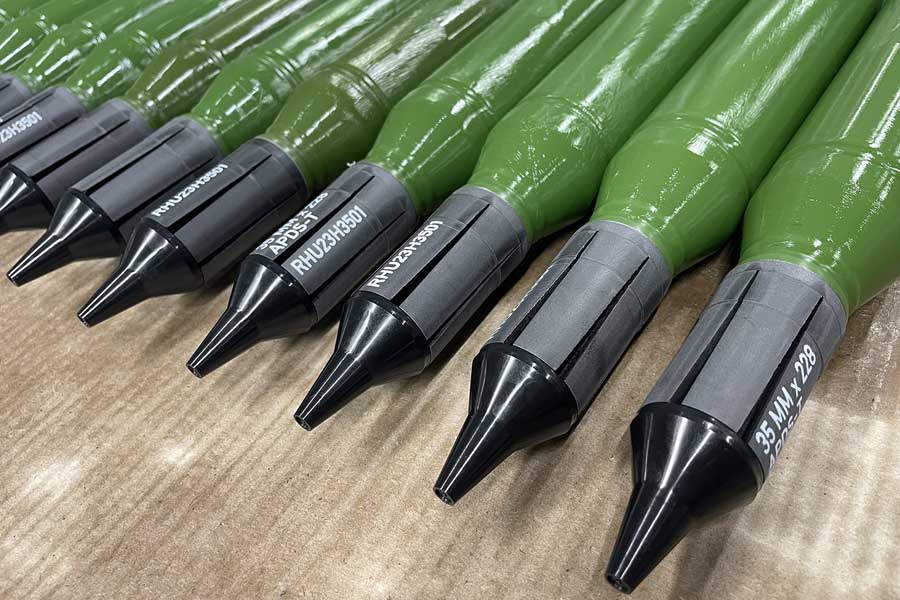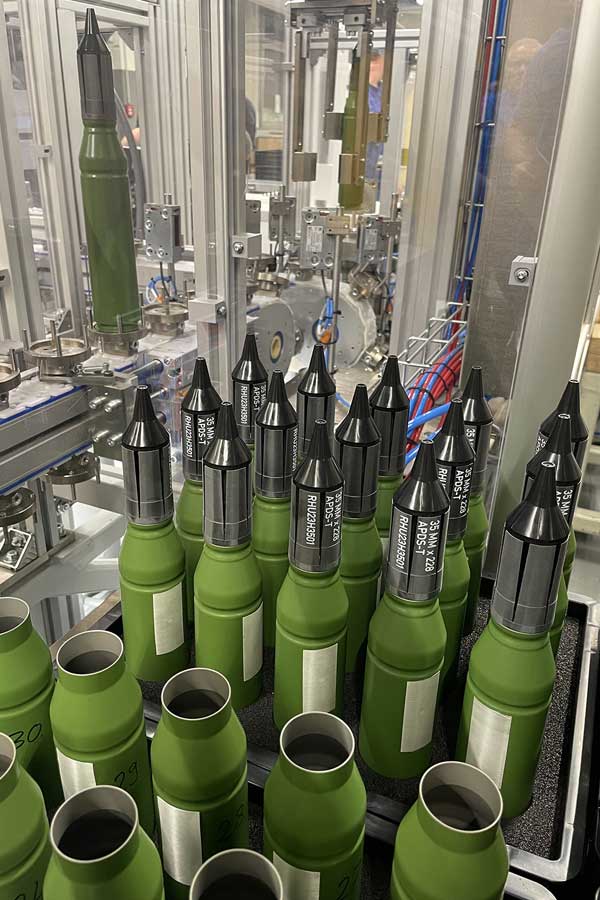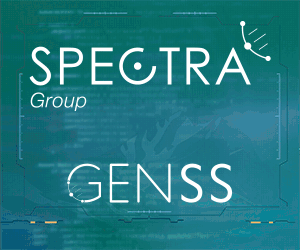Made in Germany ~ a first shipment of new Gepard 35mm anti-aircraft ammunition from Rheinmetall is now on its way to support Ukraine.
~
Press Release, Düsseldorf, 05 September 2023: A first shipment of new ammunition for the Gepard anti-aircraft tank is now headed for Ukraine. Per agreement, Rheinmetall AG of Düsseldorf has shipped a first lot of 35mm air defence ammunition as part of German support for Ukraine’s defensive struggle. By the end of this year, 40,000 rounds are to be produced and provided.
In Ukraine the shipments from Germany are eagerly awaited: with its 35mm twin guns, the Gepard has emerged as a decisive factor in the embattled nation’s fight to defend itself. The German government has made 46 of these anti-aircraft tanks available, with another six to follow. For Ukraine, they play an essential part in the struggle to control its airspace, having proved highly effective in countering the kamikaze drones Russia uses to attack Ukrainian cities. They are almost permanently in action, making ammunition consumption correspondingly high.
Rheinmetall has long produced much of its ammunition for medium-calibre weapons in Switzerland; now, however, new production capacity for supplying the Gepard systems has been created in Germany, where a multimillion-euro figure has been invested in plant and equipment.
In February 2023 Boris Pistorius, the German defence minister, announced at a meeting of the Ukraine Defence Contact Group that capacity for producing ammunition for the Gepard would be created in Germany at Rheinmetall. A contract for the rapid delivery of a total of 300,000 rounds of ammunition for the anti-aircraft tank had already been signed several days earlier. Owing to the urgency and high political relevance of the project, the pressure to complete the new facility was immense from day one, requiring a true technological and logistical tour de force.
In the words of Rheinmetall AG executive board chairman Armin Papperger: “We keep our promises. Just six months after signing the contract, we’ve already started delivery, as agreed. My sincere thanks go to the men and women of Rheinmetall who have done so much to make this project a success, even working on weekends. Our subcontractors and vendors deserve praise as well, having helped us to achieve what at first seemed impossible. The pressure to succeed was huge – but so was our commitment to getting the job done. We want to help the people of Ukraine. Every drone that’s shot down saves lives!”
The German government left no stone unturned in its effort to supply Ukraine with fresh ammunition, including abroad – albeit in vain. In Germany stocks of the ammunition had dropped to zero, as the Gepard systems had been retired from service some fifteen years earlier. Other countries declined to make available existing stocks of ammunition, citing either political considerations or constitutional restrictions. In the end, it was a tightly woven intermeshing of expertise of Rheinmetall technicians and engineers in Switzerland, Germany and Italy that made creating the new production facility possible.
The problem: earlier tools for producing the original ammunition were simply no longer there. The solution turned out to be a mix of reverse engineering and adaptive development quite unlike anything seen before: existing 35mm ammunition from the main armament of an infantry fighting vehicle was modified for use in the Gepard. Making sure that the Gepard fire control unit could reliably recognise the ammunition was a special challenge.
Despite their excellent performance, the electronics and fire control technology of the ageing anti-aircraft tank – developed in the 1960s – proved to be a veritable black box. At the same time, the supply chain for the new ammunition had to be expanded in order to minimise as far as possible the Swiss value-added share.
As Armin Papperger puts it, “We have an unbeatable strength at Rheinmetall: namely, the broad-based expertise that comes with being a systems house. Whether in ammunition development, mechanical production and materials knowledge, in the development of air defence weaponry, in comprehensive live fire testing, in the design and construction of production facilities – everywhere our experts worked with tremendous drive and great personal commitment to complete the project. They knew how urgently Ukraine needed the ammunition – and the sooner, the better.”
Following multiple tests at the Group’s proving ground at Unterlüss in Lower Saxony, the verification programme was concluded in May 2023 when the ammunition was successfully fired by a Gepard anti-aircraft tank. Meanwhile, at one of Rheinmetall’s civil sector plants in Neuss, an LAAP line was designed and subsequently built at a Group facility in Lanciano, Italy, before being transferred to Unterlüss. LAP stands for loading, assembly and packing, the process in which the cartridges are loaded with propellant; the various parts of the round are put together; and subsequently packaged. The propellant powder comes from Nitrochemie, by the way, another member of the Group.
A total of 40,000 rounds are to be delivered this year. Ukraine will be receiving 150,000 rounds each of two different types of ammunition. One of these is a sub-calibre APDS-T munition containing heavy metal penetrators, and thus especially suitable for engaging hardened targets. Rheinmetall is also supplying Ukraine with conventional HEI-T high-explosive incendiary ammunition designed for bringing down typical air defence targets, e.g. aircraft and guided missiles.
~





















